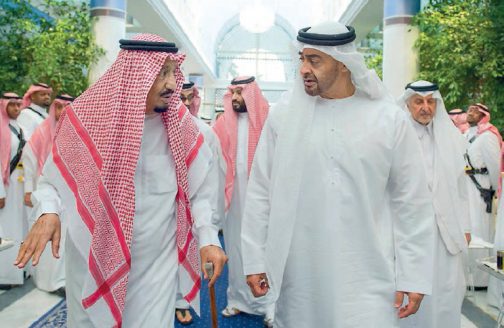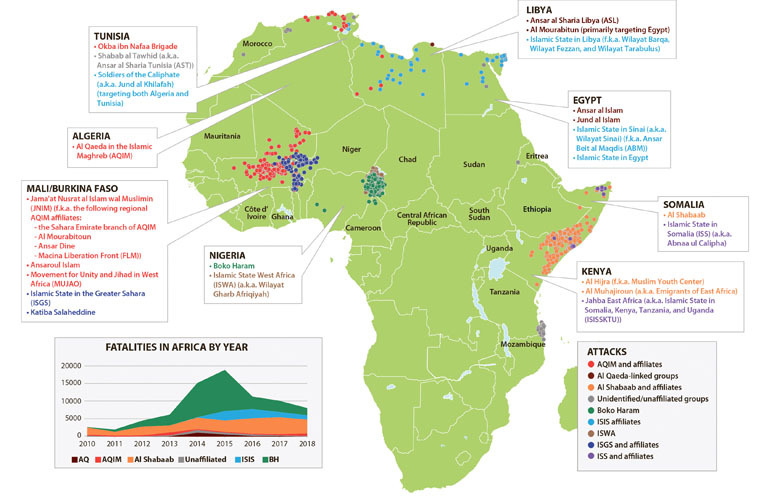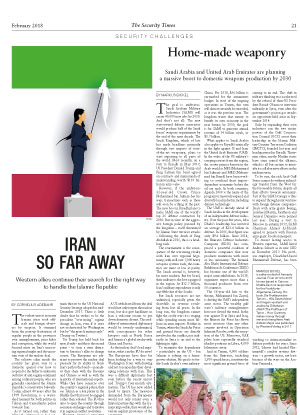Saudi Arabia and United Arab Emirates are planning a massive boost to domestic weapons production by 2030

The goal is ambitious. Saudi Arabian Military Industries (SAMI) will create 40,000 new jobs by 2030. And that’s not all: The new state-owned defense contractor would produce half of the Saudi forces’ weapons requirements by the end of the next decade. The Saudi Kingdom, which of late has made headlines primarily through vast imports of state-of-the-art weaponry, plans to start exporting to all parts of the world. Most recently, on a visit to Riyadh in May 2017, US President Donald Trump and King Salman bin Saud agreed on contracts and memoranda of understanding worth $110 billion in arms sales.
However, if the ambitious 32-year-old Crown Prince Mohammed bin Salman has his way, transactions such as these will soon be a thing of the past. The new boss in Riyadh plans to make SAMI one of the world’s top 25 defense contractors by 2030. But in view of the aggressive foreign policy pursued by the kingdom – itself threatened by Islamic State terrorist attacks – following the death of King Abdullah in 2015, this is a headlong rush.
The rearmament is the consequence of the worsening rivalry with Iran over regional hegemony; with well over 7,000 heavy weapons systems each, the countries are more or less at parity. The Saudi arsenal is, however, far more modern. But for Israel, their military is the best equipped in the region. At $12.7 billion, Iran’s military expenditure is only one-fifth that of the Saudis.
But Saudi resources are not unlimited, especially given the shortfalls in revenue resulting from low oil prices. In the long run, the kingdom cannot fight the costly wars it is waging while spending many more billions on arms imports. Neither in Yemen, where the Saudi Air Force and ground forces are directly involved in the conflict, nor indirectly in Syria is an end to the fighting in sight.
To terminate this dependency – particularly on the US – bin Salman is relying on a homegrown solution. His goal is to fortify Saudi Arabia’s own military-industrial complex – producing rockets, guided missiles, drones, ammunition and land vehicles – in just over a decade, with SAMI spearheading the effort. “The company will seek to be a key catalyst,” said Salman in the spring of 2017 on the occasion of SAMI’s founding, “to localize 50 percent of total government military spending by the year 2030.”
In 2017, the defense budget – under direct control of the aged King Salman’s favorite son – reached just under $60 billion, according to Jane’s Defense Industry. Only two states spent more money on their armed forces and new weapons: the US and China. For 2018, $56 billion is earmarked for the armaments budget. In view of the ongoing operations in Yemen, this sum will almost certainly be exceeded, as it was the previous year. The kingdom wants that money to benefit its own economy in the near future; by 2030, the goal is for SAMI to generate annual revenue of 14 billion riyals, or $3.7 billion.
What applies to Saudi Arabia also applies to Riyadh’s main ally in the fight against IS and Iran: the United Arab Emirates (UAE). In the wake of the US military’s creeping retreat from the region, the crown princes known in the Arab world as MBS (Mohammed bin Salman) and MBZ (Mohammed bin Bayed) have been working to overhaul their import-dependent economies before the oil era ends. In both countries, Agenda 2030 is the name of the program to massively expand and diversify local industry, including defense technology.
The UAE is already ahead of Saudi Arabia in the development of an independent defense industry. Over the past five years, Abu Dhabi’s leadership has invested an average of $23.4 billion in defense. In 2005, that figure was only $9.4 billion. Since 2014, the Emirates Defense Industries Company (EDIC) has comprised a powerful coalition of domestic companies that now produces munitions with more or less autonomy. The biennial Abu Dhabi International Defence Exhibition & Conference (IDEX) has become one of the world’s major arms exhibitions. In 2019, organizers expect more than a thousand producers from over 50 countries.
The 56-year-old heir to the throne, Mohammed bin Zayed, is driving the UAE’s independent arms sector. The wealthy gulf state’s military entanglements have not slowed the trend. In the war against IS in Syria and Iraq, the Emirati Air Force has flown more missions than any other country involved in Operation Inherent Resolve, with the exception of the US. Moreover, UAE pilots have repeatedly attacked jihadist positions in Libya, 4,000 kilometers away.
And in Yemen, 4,000 soldiers from the Emirates, including 1,500 special forces, constitute the most significant ground force of the anti-Iranian military alliance. The soldiers from Abu Dhabi are fighting not only against the Houthi rebels, who are supported militarily by Tehran, but also against members of al-Qaeda on the Arabian Peninsula (AQAP). UAE, which gained independence from Britain only in 1971, has seen dozens of its solders killed in Yemen.
Through their homegrown policy, the two mighty crown princes could revolutionize how the global defense industry does business in the long run; the practice of Gulf Arabs using their oil wealth for arms purchases and investments in the West is slowly coming to an end. This shift in military thinking was accelerated by the refusal of then-US President Barack Obama to intervene militarily in Syria, even after the government’s poison gas attacks on opposition-held areas in September 2014.
Only by expanding their own industries can the two major powers of the Gulf Cooperation Council (GCC) assert their leadership in the Islamic Military Counter Terrorism Coalition (IMCTC), founded last year and headquartered in Riyadh. Thirty-nine other, mostly Muslim states have since joined the alliance, which is all but certain to intensify its collaborative efforts in the medium term.
To be sure, the rich Arab Gulf States cannot do without technology transfer from the West for the foreseeable future, despite all their efforts towards autonomy. Part of the SAMI strategy is thus to expand through joint ventures with foreign defense companies. Deals with arms giants Boeing, Lockheed Martin, Raytheon and General Dynamics were penned last year. During a visit to Moscow in autumn 2017, SAMI Chairman Ahmed Al-Khatib agreed to projects with Russian arms giant Rosoboronexport.
To ensure lasting access to Western expertise, SAMI hired Andreas Schwer as its new CEO in December 2017. His previous employer, Düsseldorf-based Rheinmetall Defense, has been working to internationalize its defense portfolio for years. Since 2012, Schwer had headed Rheinmetall’s combat systems division – a growth sector, not least because of the wars on the Arabian Peninsula.
Both in the Emirates and in Saudi Arabia, the German arms contractor is doing good business. In 2016, Rheinmetall Denel Munition (RDM) – a South African joint venture – completed a munitions factory on the premises of Saudi Arabia’s Military Industries Corporation (MIC) in Al Kharj, southeast of Riyadh. Its goal is the daily production of 300 artillery and 600 mortar rounds for the Saudi armed forces, but also for export.
MARKUS BICKEL
is editor-in-chief of Amnesty Journal. From 2012 to 2015 he was based in Cairo as Middle East correspondent for the Frankfurter Allgemeine Zeitung. His book Die Profiteure des Terrors – Wie Deutschland an Kriegen verdient und arabische Diktaturen stärkt (The Profiteers of Terror – How Germany makes money through war and strengthens Arab dictatorships) was published by Westend-Verlag in 2017.



